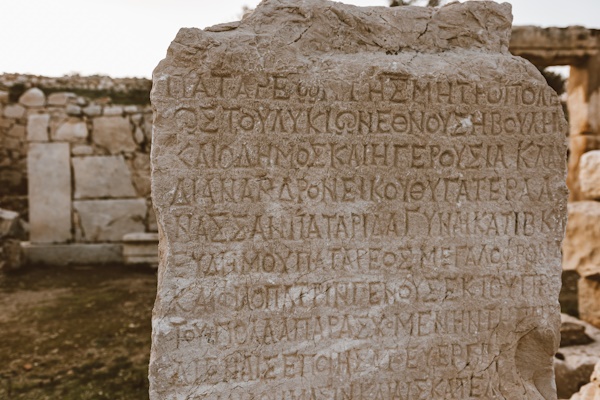- Κωδικός / Course Code: ΘΕΣΠ512
- ECTS: 15
- Τρόποι Αξιολόγησης / Assessment:
10% interactive educational activities, 30% written assignments and 60% final examination
- Διάρκεια Φοίτησης/ Length of Study: Εξαμηνιαία (χειμερινό) / Semi-annual (fall)
- Κόστος/ Tuition Fees: €425
- Επίπεδο Σπουδών/ Level: Μεταπτυχιακό/ Postgraduate
Module Purpose and Objectives
In this module students gain a global insight into the history of Western theatre from its dawn to the late 17th c. The greatest landmarks in theatre history are looked at here, along with the types of drama and the most important trends and schools, their major representatives, as well as the most notable developments in theatre architecture, scenography, direction, acting etc.
Beyond a historically oriented venture into theatre development, this module includes thorough reading and interpretation of 13 major plays of Western drama from antiquity to circa 1700. The plays are select specimens of world drama, offering students the opportunity to acquaint themselves with telling evidence of dramatic composition from different stages of theatre history. In this way, the two aspects of this unit (theatre history and drama) complement each other.
Module Content
Α. History of Theatre
- The origins of theatre
- Theories on the ritual origins of theatre
- Performative actions: elements and functions foregrounding theatre and ritual
- Ritual performances in Egypt and the Near East
- Theatre and drama in ancient Greece
- The origin of tragedy
- The City Dionysia in the 6th c.
- Tragedy in the 5th
- The satyr play
- Greek comedy in the 5th
- Dramatic festivals in the 5th
- Play selection and financing
- Actors and acting
- The Chorus in ancient drama
- Music and dance in the ancient drama
- Costumes and masks in the ancient drama
- The architecture of the ancient theatre
- Athenian theatre after the 5th
- Hellenistic and Roman period
- The Hellenistic theatre
- Aristotle’s Poetics
- New Comedy: antecedents, features, standardization
- Actors and acting
- Costumes
- Theatre architecture
- The mime in ancient Greece
- Roman theatre: prehistory (Etruscan antecedents)
- Drama under the Roman Empire
- Production of spectacles in the Roman theatre
- Roman theatre architecture
- Scenery
- Actors and acting
- Masks and costumes
- Music
- The Byzantine theatre
- Theatre from 500 to 900 AD. Liturgical drama.
- European theatre in the Middle Ages from 500 to 900 AD.
- Liturgical drama
- The staging of liturgical drama
- The Vernacular Religious Drama (in languages other than Latin)
- Performing religious drama
- Staging of liturgical/religious drama
- Audiences and Auditoriums
- Secular forms: farce, liturgical drama, the morality play
- Interludes
- English theatre from the Middle Ages to 1642
- Early Tudor drama
- The University Wits
- Shakespeare and his contemporaries
- Jacobine and Caroline dramatists
- Acting Companies
- Public theatres in England during the 16th and 17th
- Private theatres in England during the 16th and 17th
- Spanish theatre to 1700
- Religious drama
- Secular drama
- The origins of professional theatre
- Lope de Vega and his contemporaries
- Calderon and his contemporaries
- The Corrales
- Renaissance drama in Italy
- The neoclassical ideal
- The development of theatre architecture
- Commedia dell’arte
- French theatre
- Public theatre, 1595-1629
- The triumph of the neoclassical ideal
- Acting Companies, 1629-1660
- French drama
- The organization of French Acting Companies
B. List of plays
- Aeschylus, Seven against Thebes
- Sophocles, Philoctetes
- Euripides, Iphigeneia in Tauris
- Euripides, Cyclops
- Aristophanes, Clouds
- Terence, Eunuch
- G. Chortadjis, Erofili
- Shakespeare, Romeo and Juliet
- Shakespeare, Macbeth
- Lope de Vega, Fuente Ovejuna
- Machiavelli, La Mandragola
- Molière, Dom Juan
- Racine, Phèdre




